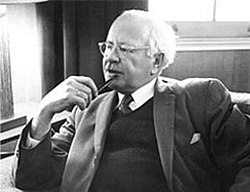William L. Shirer Quote
In the summer of 1931, Otto Dietrich, Hitler’s press chief first for the party and later for the Reich, relates, the Fuehrer suddenly decided to concentrate systematically on cultivating the influential industrial magnates.14 What magnates were they? Their identity was a secret which was kept from all but the inner circle around the Leader. The party had to play both sides of the tracks. It had to allow Strasser, Goebbels and the crank Feder to beguile the masses with the cry that the National Socialists were truly socialists and against the money barons. On the other hand, money to keep the party going had to be wheedled out of those who had an ample supply of it. Throughout the latter half of 1931, says Dietrich, Hitler traversed Germany from end to end, holding private interviews with prominent [business] personalities. So hush-hush were some of these meetings that they had to be held in some lonely forest glade. Privacy, explains Dietrich, was absolutely imperative; the press must have no chance of doing mischief. Success was the consequence.
In the summer of 1931, Otto Dietrich, Hitler’s press chief first for the party and later for the Reich, relates, the Fuehrer suddenly decided to concentrate systematically on cultivating the influential industrial magnates.14 What magnates were they? Their identity was a secret which was kept from all but the inner circle around the Leader. The party had to play both sides of the tracks. It had to allow Strasser, Goebbels and the crank Feder to beguile the masses with the cry that the National Socialists were truly socialists and against the money barons. On the other hand, money to keep the party going had to be wheedled out of those who had an ample supply of it. Throughout the latter half of 1931, says Dietrich, Hitler traversed Germany from end to end, holding private interviews with prominent [business] personalities. So hush-hush were some of these meetings that they had to be held in some lonely forest glade. Privacy, explains Dietrich, was absolutely imperative; the press must have no chance of doing mischief. Success was the consequence.
Related Quotes
About William L. Shirer
As a young man just out of college, in 1925 Shirer was hired by the Chicago Tribune and later worked for the International News Service; he was the first reporter hired by Edward R. Murrow for what became a CBS radio team of journalists known as "Murrow's Boys". He became well known for his broadcasts from Berlin, from the rise of the Nazi dictatorship through the first year of World War II. Together with Murrow, on Sunday, March 13, 1938, he organized the first broadcast world news roundup, a format still followed by news broadcasts.
Shirer published 14 books besides The Rise and Fall of the Third Reich, including Berlin Diary (published in 1941), The Collapse of the Third Republic (1969), several novels, and a three-volume autobiography, 20th Century Journey (1976 to 1990).
